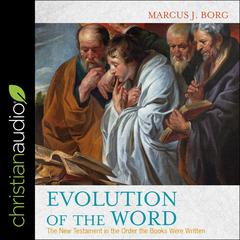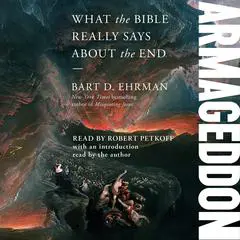 Play Audiobook Sample
Play Audiobook Sample
The First Paul: Reclaiming the Radical Visionary Behind the Church's Conservative Icon Audiobook
 Play Audiobook Sample
Play Audiobook Sample
Quick Stats About this Audiobook
Total Audiobook Chapters:
Longest Chapter Length:
Shortest Chapter Length:
Average Chapter Length:
Audiobooks by this Author:
Publisher Description
Paul is second only to Jesus as the most important person in the birth of Christianity, and yet he continues to be controversial, even among Christians. How could the letters of Paul be used both to inspire radical grace and to endorse systems of oppression—condoning slavery, subordinating women, condemning homosexual behavior?
Borg and Crossan use the best of biblical and historical scholarship to explain the reasons for Paul's mixed reputation and reveal to us what scholars have known for decades: that the later letters of Paul were created by the early church to dilute Paul's egalitarian message and transform him into something more "acceptable." They argue there are actually "Three Pauls" in the New Testament: "The Radical Paul" (of the seven genuine letters), "The Conservative Paul" (of the three disputed epistles), and "The Reactionary Paul" (of the three inauthentic letters). By closely examining this progression of Paul's letters—from the authentic to the inauthentic—the authors show how the apostle was slowly but steadily "deradicalized" to fit Roman social norms in regards to slavery, patriarchy, and patronage. In truth, Paul was an appealing apostle of Jesus whose vision of life "in Christ"—one of his favored phrases—is remarkably faithful to the message of Jesus himself.
Download and start listening now!
"Borg and Crossan did, indeed, change the way I look at Paul. I was most interested in the context for the "Son of God" and "The Lord" titles, and the comparison between the pax Romana and Jesus's vision for peace. I thought there was a little too much emphasis on what not to read into the text."
— Polly (4 out of 5 stars)
The First Paul Listener Reviews
-
" We are discussing this book at church. Again, Marcus Borg gives a new, enlightening perspective on some very old (and sometimes damaging) ideas. He focuses his attention on several misrepresentations of the apostle Paul. "
— Pieter, 2/12/2014 -
" I never much liked Paul's letters- pretty reactionary. Crossan and Borg make the case that the real Paul was strongly anti-Rome where the later letters (likely not Paul) tamed him and made him a supporter of the dominant culture (women keep silent and obey your husbands, etc) "
— Gail, 1/15/2014 -
" Excellent, well-presented and thought-provoking. Borg and Crossan wear me out, it takes me a while to read and digest. "
— Heather, 1/7/2014 -
" This was a fairly interesting book about Paul and his writings. I liked the section about his conversion and the observation that he was indeed a Jewish/Christian mystic. However, I don't think Paul's mysticism was recalled when looking at his writings which was a disappointment. "
— Gaylene, 12/7/2013 -
" This was the first Borg/Crossan book I've read that wasn't a nice reminder of my seminary studies. I never really explored Paul then. This was a nice way to dig in -- though it leaves me wanting more in some places and less in others. "
— Elsa, 12/5/2013 -
" Thoughtful study of St. Paul's theology. Here Borg manages to write to a popular audience while retaining a scholarly approach and thus appeals to the academic as well. "
— Rusty, 11/5/2013 -
" Insightful attempt to rescue St Paul (and thus Christianity) from the miserable clutch of the fundamentalists and the dead-hand of orthodoxy. "
— Martinxo, 10/21/2013 -
" Getting ready for our trip!! "
— Sandi, 8/16/2013 -
" Changed the way I see and read Paul for the better. Sets up the political, social, and aesthetic context in which Paul wrote and in which others co-opt Paul and perform "Paul" in order to change the face of early Christianity. "
— Kristin, 6/2/2013 -
" I thought it was a little light at first but as I read through it I began to really see things differently and to ponder on some new ideas. Really enjoyed it. "
— Bob, 2/21/2012 -
" There were many good take-a-ways in this book. It was somewhat repetitive, probably to get the authors' point across. "
— Evelyn, 6/7/2011 -
" Empire = Religion --> War --> Victory --> Peace<br/>vs. <br/>Christianity = Religion --> Nonviolence --> Justice --> Peace "
— Nick, 12/6/2010 -
" The end was stunning. There were wonderful quotes. I was very glad to learn more about Paul. As always I love Marcus Borg's revolutionary message. He recalls the ideas of the martyr Oscar Romero so very strongly. "
— Denzil, 9/30/2010 -
" Everything written by these gentlemen needs to be read --- learning lots "
— Jamie, 8/31/2010 -
" Insightful attempt to rescue St Paul (and thus Christianity) from the miserable clutch of the fundamentalists and the dead-hand of orthodoxy. "
— Martinxo, 5/29/2010 -
" This short book has one message: that Paul's faith centered on a nonviolent God and required distributive justice. "
— Nick, 4/20/2010 -
" This was the first Borg/Crossan book I've read that wasn't a nice reminder of my seminary studies. I never really explored Paul then. This was a nice way to dig in -- though it leaves me wanting more in some places and less in others. "
— Elsa, 11/11/2009 -
" We are discussing this book at church. Again, Marcus Borg gives a new, enlightening perspective on some very old (and sometimes damaging) ideas. He focuses his attention on several misrepresentations of the apostle Paul. "
— Pieter, 10/22/2009
About the Authors
Marcus J. Borg (1942–2015) was canon theologian at Trinity Episcopal Cathedral in Portland, Oregon, and Hundere Distinguished Professor of Religion and Culture, emeritus, at Oregon State University. A Fellow of the Jesus Seminar, he had been national chair of the Historical Jesus section of the Society of Biblical Literature and was the author of the bestselling books Meeting Jesus Again for the First Time, The Heart of Christianity, Reading the Bible Again for the First Time, The God We Never Knew, Jesus, and Speaking Christian.
John Dominic Crossan is an Irish-American New Testament scholar, historian of early Christianity, and former Catholic priest who has produced both scholarly and popular works



















